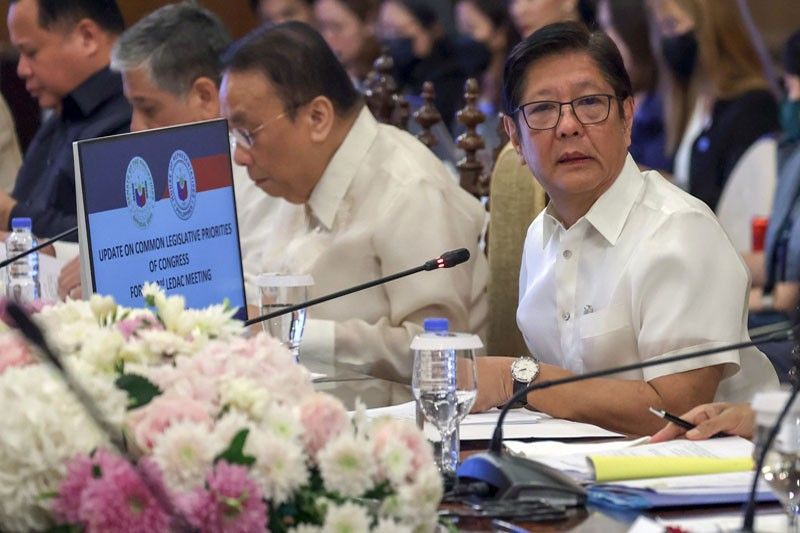Congress sends Maharlika bill to Malacañang

MANILA, Philippines — The measure creating the controversial Maharlika Investment Fund (MIF) – a pet bill of the administration – has been transmitted to Malacañang for President Marcos’ signature.
In a text message, Presidential Communications Secretary Cheloy Garafil said a copy of the enrolled bill was received by the Office of the Deputy Executive Secretary for Legal Affairs last Tuesday.
Garafil said yesterday that no date has been set for the signing of the measure since the legal affairs office is still conducting complete staff work.
Economic managers have been pushing for the signing of the MIF bill before Marcos’ second State of the Nation Address (SONA) on July 24, according to Budget Secretary Amenah Pangandaman.
Under the 1987 Constitution, the President has 30 days to sign or veto a measure sent to his office. If the President does not act on the bill within 30 days, it lapses into law.
Last month, Marcos said he would sign the MIF bill into law as soon as he gets it. He has also allayed concerns over the perceived risks of the investment fund, saying most of the proposed changes to the measure that were adopted were related to the security of pension funds.
Congress passed the MIF bill last May. The investment fund will allow the government to invest in various outlets like foreign currencies, fixed-income instruments, corporate bonds, commercial real estate and infrastructure projects.
The MIF seeks to execute and sustain high-impact infrastructure and development projects, ease fiscal constraints and maximize expected returns for the Philippines’ investments, according to economic managers.
They said the fund is also meant to promote socio-economic development by making strategic and profitable investments in key sectors.
Sectors opposed to the measure are worried that the MIF might end up becoming like the 1Malaysia Development Berhad, which was marred by graft allegations.
Twenty-one economics professors from the University of the Philippines have criticized the bill, saying it “violates fundamental principles of economics and finance, and poses serious risks to the economy and the public sector, notwithstanding its proponents’ good intentions.”
They claimed that the MIF bill lacked clear focus and does not thresh out the nature of the financial and economic returns that the fund is expected to generate.
The MIF fund is not among the 19 priority bills mentioned by Marcos during his first SONA; however, he certified the measure as urgent last May, citing the need for a “compelling need for a sustainable national investment fund as a new growth catalyst to accelerate the implementation of strategic and high-impact large infrastructure projects that will stimulate economic activity and development.”
20 priority bills
The Legislative-Executive Development Advisory Council (LEDAC) approved 20 measures to be prioritized and passed within the year during its second full meeting presided over by Marcos at Malacañang yesterday, less than three weeks before his second SONA.
Among these measures are the proposed amendments to the Build-Operate-Transfer Law or the Public-Private Partnership Act, National Disease Prevention Management Authority, Internet Transactions Act/E-Commerce Act, Health Emergency Auxiliary Reinforcement Team or HEART Act (formerly Medical Reserve Corps), Virology Institute of the Philippines Act, Mandatory Reserve Officers’ Training Corps and National Service Training Program Act, Revitalizing the Salt Industry, Valuation Reform Act, E-Government/E-Governance Act and Ease of Paying Taxes Act.
Also targeted to be passed this year are the proposed National Government Rightsizing Program, Unified System of Separation/Retirement and Pension of Military and Other Uniformed Personnel, Local Government Unit Income Classification, Waste-to-Energy Act, New Philippine Passport Act, Magna Carta of Filipino Seafarers, National Employment Action Plan, Amendments to the Anti-Agricultural Smuggling Act, Bangko Sentral ng Pilipinas (BSP)-endorsed Bank Deposit Secrecy Act and Anti-Financial Account Scamming Act (AFASA).
Garafil said 18 of the 20 bills were part of 42 priority legislative measures during the first LEDAC meeting in October last year.
Of the 42 bills, three – Republic Act 11934, or An Act Requiring the Registration of Subscriber Identity Module; RA 11935, or the Act Postponing the Barangay and Sangguniang Kabataan Elections; and RA 11939, or an Act on the Amendment to the Armed Forces of the Philippines’ Fixed Term – had been signed into law.
Garafil said three proposed measures – House Bill 6608, or the Maharlika Investment Fund Act; HB 7751, or the Department of Health Specialty Centers Act and HB 6336, or New Agrarian Emancipation Act – are up for the President’s signature.
Other priority measures include the proposed Passive Income and Financial Intermediary Taxation Act, National Land Use Act, Enabling Law for the Natural Gas Industry, Apprenticeship Law, Philippine Ecosystem and Natural Capital Accounting System, Government Financial Institutions Unified Initiatives to Distressed Enterprises for Economic Recovery or GUIDE, Free Legal Assistance for Police and Soldiers, Negros Island Region, Leyte Ecological Industrial Zone, Eastern Visayas Development Authority, Philippine Immigration Act, Comprehensive Infrastructure Development Master Plan and Magna Carta of Barangay Health Workers.
Five bills are in various stages of the legislative process: Budget Modernization Bill, Amendments to the Electric Power Industry Reform Act, Department of Water Resources, National Defense Act and Amendments to the Universal Health Care Act.
Speaker Martin Romualdez said of the remaining 36 priority measures from the first LEDAC, they have passed 32 measures on third and final reading in the House of Representatives.
On top of the SONA priority bills, several legislative measures are also being proposed for inclusion in the common legislative agenda (CLA).
The CLA is a list of priority legislative measures of the executive and legislative branches of government, which the council has agreed to actively pursue to be passed in Congress.
In a separate interview, Pangandaman said they agreed to pass 18 priority bills by December. - Cecille Suerte Felipe, Elijah Felice Rosales, Louella Desiderio
- Latest
- Trending






























